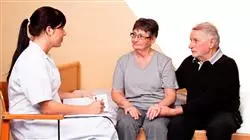University certificate
The world's largest faculty of medicine”
Introduction to the Program
With acceptance and commitment therapy you will help your patients to assimilate the negative aspects of their cancer experience"

Cancer is associated with an experience of suffering and vulnerability, which generates high levels of stress in patients and their families. Consequently, more and more voices in the scientific community advocate the need to provide psychological support to those affected by the disease, as this reduces the side effects of exhaustion, increasing the quality of life and survival.
Accordingly, this Postgraduate diploma in Psychological Treatment of Cancer Patients and their Families will focus, first of all, on providing the most relevant cognitive-behavioral models within the discipline. Therefore, the student will learn the techniques of problem solving, cognitive restructuring, guided imagination, among others. All of them have been tested by experts in the area and have proven to be suitable to help the process of coping with the disease. Additionally, they facilitate the alliance between the physician and the patient at the moment of planning a strategy that helps to improve the quality of life of the patient.
Secondly, the impact of the location of the tumor on the patient's psyche will be studied. In this way, the student will learn to discriminate between the emotions generated by colorectal cancer and those derived from breast cancer, the latter receiving greater attention from the scientific community due to its great impact on self-esteem, body image and the female role in society.
Finally, they will learn about the interventions that are applied in areas related to cancer, allowing students to develop a program that helps people to prevent lung disease as a result of years of tobacco abuse. Additionally, they will be able to select and train volunteers to create an external support network for the patient. For all these reasons, the physician will be more than qualified to participate in an integral way in any oncological hospital center at a national and international level.
Patients need to understand their suffering in order to receive the right medical support"
This Postgraduate diploma in Psychological Treatment of Cancer Patients and their Families contains the most complete and up-to-date scientific program on the market. The most important features include:
- Practical cases presented by experts in psycho-Oncology and medicine
- The graphic, schematic, and practical contents with which they are created, provide scientific and practical information on the disciplines that are essential for professional practice
- The practical exercises where the self-evaluation process can be carried out to improve learning
- Special emphasis on innovative methodologies for psychological intervention with cancer patients
- Theoretical lessons, questions to the expert, debate forums on controversial topics, and individual reflection assignments
- Content that is accessible from any fixed or portable device with an Internet connection
Help your patients to prepare themselves psychologically for the different cancer treatments and the side effects they may experience"
The program’s teaching staff includes professionals from the sector who contribute their work experience to this educational program, as well as renowned specialists from leading societies and prestigious universities.
Its multimedia content, developed with the latest educational technology, will allow the professional a situated and contextual learning, that is, a simulated environment that will provide an immersive training programmed to train in real situations.
The design of this program focuses on Problem-Based Learning, in which the professional will have to try to solve the different professional practice situations that will arise throughout the academic course. For this purpose, the student will be assisted by an innovative interactive video system created by renowned experts.
Employ group therapy in your treatment syllabus to avoid feelings of loneliness in oncology patients"

Assess and intervene in emotions and disruptive behaviors at each stage of the disease"
Why study at TECH?
TECH is the world’s largest online university. With an impressive catalog of more than 14,000 university programs available in 11 languages, it is positioned as a leader in employability, with a 99% job placement rate. In addition, it relies on an enormous faculty of more than 6,000 professors of the highest international renown.

Study at the world's largest online university and guarantee your professional success. The future starts at TECH”
The world’s best online university according to FORBES
The prestigious Forbes magazine, specialized in business and finance, has highlighted TECH as “the world's best online university” This is what they have recently stated in an article in their digital edition in which they echo the success story of this institution, “thanks to the academic offer it provides, the selection of its teaching staff, and an innovative learning method aimed at educating the professionals of the future”
A revolutionary study method, a cutting-edge faculty and a practical focus: the key to TECH's success.
The most complete study plans on the university scene
TECH offers the most complete study plans on the university scene, with syllabuses that cover fundamental concepts and, at the same time, the main scientific advances in their specific scientific areas. In addition, these programs are continuously being updated to guarantee students the academic vanguard and the most in-demand professional skills. In this way, the university's qualifications provide its graduates with a significant advantage to propel their careers to success.
TECH offers the most comprehensive and intensive study plans on the current university scene.
A world-class teaching staff
TECH's teaching staff is made up of more than 6,000 professors with the highest international recognition. Professors, researchers and top executives of multinational companies, including Isaiah Covington, performance coach of the Boston Celtics; Magda Romanska, principal investigator at Harvard MetaLAB; Ignacio Wistumba, chairman of the department of translational molecular pathology at MD Anderson Cancer Center; and D.W. Pine, creative director of TIME magazine, among others.
Internationally renowned experts, specialized in different branches of Health, Technology, Communication and Business, form part of the TECH faculty.
A unique learning method
TECH is the first university to use Relearning in all its programs. It is the best online learning methodology, accredited with international teaching quality certifications, provided by prestigious educational agencies. In addition, this disruptive educational model is complemented with the “Case Method”, thereby setting up a unique online teaching strategy. Innovative teaching resources are also implemented, including detailed videos, infographics and interactive summaries.
TECH combines Relearning and the Case Method in all its university programs to guarantee excellent theoretical and practical learning, studying whenever and wherever you want.
The world's largest online university
TECH is the world’s largest online university. We are the largest educational institution, with the best and widest online educational catalog, one hundred percent online and covering the vast majority of areas of knowledge. We offer a large selection of our own degrees and accredited online undergraduate and postgraduate degrees. In total, more than 14,000 university degrees, in eleven different languages, make us the largest educational largest in the world.
TECH has the world's most extensive catalog of academic and official programs, available in more than 11 languages.
Google Premier Partner
The American technology giant has awarded TECH the Google Google Premier Partner badge. This award, which is only available to 3% of the world's companies, highlights the efficient, flexible and tailored experience that this university provides to students. The recognition as a Google Premier Partner not only accredits the maximum rigor, performance and investment in TECH's digital infrastructures, but also places this university as one of the world's leading technology companies.
Google has positioned TECH in the top 3% of the world's most important technology companies by awarding it its Google Premier Partner badge.
The official online university of the NBA
TECH is the official online university of the NBA. Thanks to our agreement with the biggest league in basketball, we offer our students exclusive university programs, as well as a wide variety of educational resources focused on the business of the league and other areas of the sports industry. Each program is made up of a uniquely designed syllabus and features exceptional guest hosts: professionals with a distinguished sports background who will offer their expertise on the most relevant topics.
TECH has been selected by the NBA, the world's top basketball league, as its official online university.
The top-rated university by its students
Students have positioned TECH as the world's top-rated university on the main review websites, with a highest rating of 4.9 out of 5, obtained from more than 1,000 reviews. These results consolidate TECH as the benchmark university institution at an international level, reflecting the excellence and positive impact of its educational model.” reflecting the excellence and positive impact of its educational model.”
TECH is the world’s top-rated university by its students.
Leaders in employability
TECH has managed to become the leading university in employability. 99% of its students obtain jobs in the academic field they have studied, within one year of completing any of the university's programs. A similar number achieve immediate career enhancement. All this thanks to a study methodology that bases its effectiveness on the acquisition of practical skills, which are absolutely necessary for professional development.
99% of TECH graduates find a job within a year of completing their studies.
Postgraduate Diploma in Psychological Treatment of Cancer Patients and their Families
Cancer is a disease that affects not only the patient, but also their family and loved ones. As a psychology professional, you can play a vital role in the support and treatment of people facing this difficult situation. Become an expert in the psychological treatment of cancer patients and their families through the Postgraduate Diploma in Psychological Treatment of Cancer Patients and their Families at TECH Global University. This programme will provide you with the knowledge and skills necessary to address the psychological aspects related to cancer and its impact on the lives of patients and their families. Through this course, you will learn the most effective therapeutic techniques and strategies to help patients cope with the diagnosis, cope with treatment and manage the emotions and concerns that arise throughout the process. The Postgraduate Diploma is delivered entirely online, giving you the flexibility to study at your own pace and from anywhere. You will be supported by experienced cancer psychology professionals who will guide you through your learning and provide you with the tools you need to provide comprehensive support to patients and their families.
Specialise 100% online at the best digital university in the world
This programme is aimed at psychology professionals, clinical psychologists, psychotherapists and other specialists interested in expanding their knowledge and skills in the psychological treatment of cancer patients and their families. It is also suitable for those who wish to dedicate themselves to the field of oncological psychology and work in interdisciplinary cancer care teams. Upon completion of the Postgraduate Diploma in Psychological Treatment of Cancer Patients and their Families, you will be prepared to provide specialist psychological support to cancer patients and their families, helping them to cope with the emotional and psychological challenges associated with the disease.







